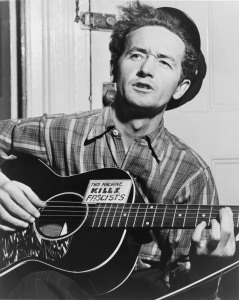As part of my Public History course I am studying oral history. This year’s cohort of students have been co-opted into a university project which will be interviewing successful female scientists who were former graduates of Royal Holloway or Bedford College. However, as part of our course we also had to post an entry on our course blog, Voice of the Publics, discussing which area of oral history we would like to do a project on if we were given a completely free rein. Given a choice, the topic I would like to explore for my initial oral history project is the post-war revival in English traditional music.

There are two main areas I’d like to look at. The first is the development of the music as a genre, looking at how skiffle and the work of American artists like Woody Guthrie and Pete Seeger encouraged an interest in playing simple folk songs and how this gradually morphed into a whole range of interpretations of traditional music culminating in the emergence of electric folk bands like Fairport Convention and Steeleye Span, as well as free reed/brass combinations like Brass Monkey, Home Service and Bellowhead. I’d like to look at how the musicians working in this genre searched for and revived these old songs whether it be looking in the archives of the great Victorian folksong collectors, collecting new material from the Traveller community or from sources such as the Copper Family. I’d also look at the individual paths which had brought musicians into this kind of music and how their interest in the genre developed. Another aspect to explore would be the clash of attitudes over what was and wasn’t permissible in terms of instrumentation and arrangement during the “folk wars” of the 60s and 70s, and the influence of key figures such as Ewan MacColl and Bert Lloyd in shaping these attitudes.
The second area to explore is the social history behind the folk music revival. What sorts of people were attracted to the music? How did folk clubs and folk camps develop? How big a part do formal organisations like EFDSS play in the lives of performers, and does this relationship differ between amateur and professional musicians? English traditional folk music has always been somewhat marginalised compared to the folk traditions of other countries. Whereas folk music in much of Europe is often linked to national identity (and thus to a degree nationalism) this is less the case in England where on the whole English folk musicians have been of the left, and have had an internationalist outlook. Many English folk songs address the problems of class, poverty and conflict, and this tradition has often been carried on in the subject matter of contemporary songs written by musicians working in the idiom. A major aspect of the project would therefore be exploring the participants’ political beliefs and discussing the political events that have had an impact on their music. It would also be interesting to explore the importance of local or regional identity with those performers whose music is strongly rooted in a particular community.
The folk revival is worthy of an oral history study in itself as a significant social movement in the latter half of the twentieth century and because much of the contemporary output it produced reflected the social concerns of the day. At the same time it is significant in that it has recovered and made available voices from our lost past. We can’t do the oral history of 18th and 19th century working people and they are often missing from the historical record, so the revival of their songs is one of the main ways we have of understanding their lives and concerns.
There are many names that spring to mind as obvious candidates to interview for this project, but if I had to narrow it down my first choice would be one from a shortlist of Martin Carthy, Peggy Seeger, John Tams and Shirley Collins.
For a good book on this subject I can recommend J.P. Bean’s Singing From The Floor
LikeLike